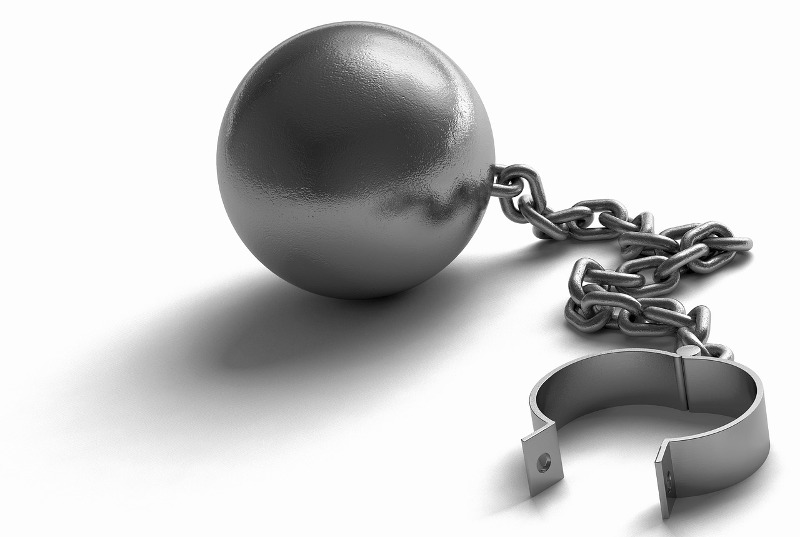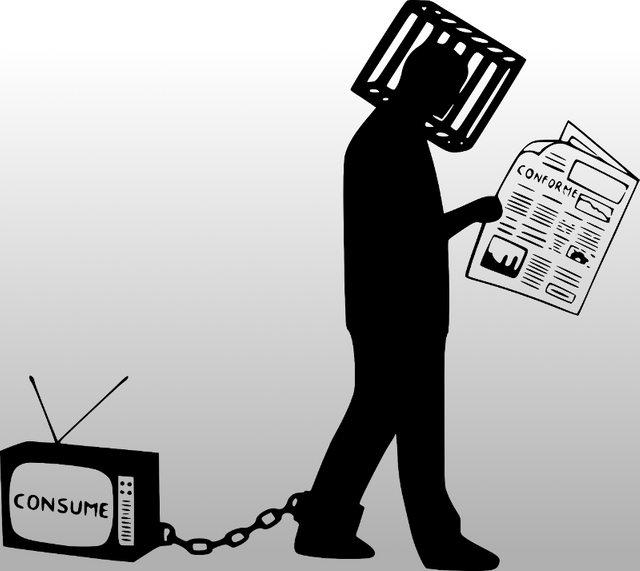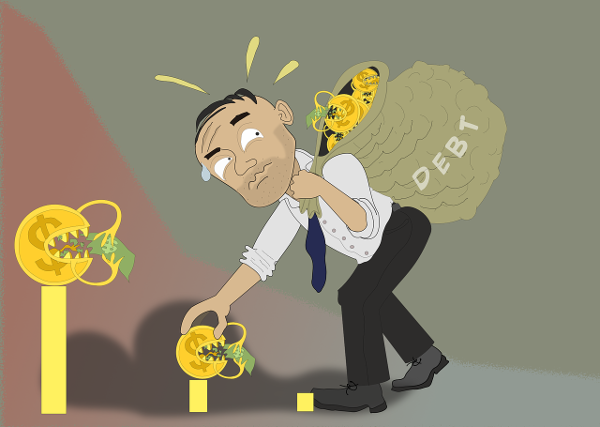Breaking the Chains of Financial Slavery!
Image Source: Pixabay.com License CC-0
This year I was able to walk away from my job without worrying about losing my car, house, or possessions. For the few years before that, I worked because I wanted to work, not because I had to work. For many people on this site, that is "THE DREAM". I'm guessing those who are chasing the crypto-currency craze right now are doing so for that very reason. So, am I rich? Nope, far from it... Well, it really depends on how you define rich. If you define rich as being able to buy a Lamborghini or charter a private jet on a whim then I am DEFINITELY NOT RICH. I am, however, debt-free and would define it as financially comfortable which I think is often confused with rich. I still need to bring in income but I don't need much to make ends meet. This affords me a lot of opportunities that I didn't have just a few short years ago. The experience of getting there also opened my eyes to just how crippled the average U.S. citizen is in making sound financial decisions. Of course, I was in that boat not too long ago.
Disclaimer: I AM NOT A FINANCIAL ADVISOR. This article is not financial advice, but rather an explanation of the steps I took to become debt free.
How did it happen?
Somewhere around 2008 or 2009, I heard a radio show by Dave Ramsey that he still broadcasts regularly today. His whole show was about becoming debt free and the perks that it offers you. People would call in and discuss their financial situation and he would offer practical guidance on how they could improve their situation. Occasionally some people would call into the show and proclaim they were debt free and celebrate over the radio with him and his listeners. Now, I am not affiliated with Mr. Ramsey in any way, nor did I take the course he sells, but I did pay attention to the advice he offered on his show and then dug more into the subject. I discussed the idea with my wife because we're both in the same financial boat via marriage, and we decided to start making some changes. Our journey took about 5 years to complete. Sometimes it was extremely hard to stay on course. There are A LOT of opportunities to rationalize your way out of it and let's face it, life always has a way of kicking you in the teeth every now and then.
Why did you use the term slavery? Isn't that harsh or insensitive?
I don't think so, and I certainly don't mean to offend anyone. But when you commute to work in the morning, take a moment to look at others who are commuting. Do they look happy and enthusiastic to go to their job? I've actually done this experiment more than a few times. The morning commute is filled with people who are on auto-pilot. They look like they've had the life sucked out of them. Almost soulless. Now here's another question. How many of them could COMFORTABLY stop the car - call their boss and say "You know, I'm gonna take the day off. I just need a personal day, thanks bye." My guess is most of them would be scared to death to do that for fear of losing their jobs.
To be clear, I'm talking about being a slave to your debt and your possessions. If you have debt, you are obligated to pay it back in a timely manner. To do so, most people find one or more jobs to pay back the debt and meet the necessary expenses of life (food, utilities, shelter). The latter in most cases is significantly less expensive than the former. Are you working because you want to work or because you have to work? There's a massive difference. By being in debt you are forced to do work to pay it off. Since you NEED your employment to pay your debt, you alter your behavior to accommodate your employer more than you would have if you didn't need the job. Your brain tells you that you can't afford to lose the job which adds anxiety to the equation. You don't perceive yourself as being free.
Image Source: Pixabay.com License CC-0
Life is different when you work because you want to work. Your relationship with your employer is better for starters. You tend to be more honest with your employer because the fear of upsetting them is lessened (which in my experience they appreciate more as long as you're professional about it). You don't make decisions at work out of fear of being fired but rather out of what you think is the right thing to do. And, should you be unfortunate enough to work for someone who wields threats of firing as their primary means of motivation, you are immune to its sting.
Is this article for you?
I can't speak to countries that are not the U.S. (though I imagine that many non-U.S. citizens are in similar circumstances), but if you're an average citizen in the U.S. right now here's how you stack up in debt according to NerdWallet's 2017 Study. Look at these numbers and see if these resonate with you:
Image Source: Pixabay.com License CC-0
| Type of Debt | Total owed by average U.S. houshold |
|---|---|
| Credit Cards | $15,654 |
| Mortgages | $173,995 |
| Auto loans | $27,669 |
| Student loans | $46,597 |
Holy crap! That is nauseating to look at.
If this resonates with you then please keep reading and let me encourage you to begin your journey towards freedom!
You can do this!
Alright, you made it this far so I'm guessing I've at least captured your attention. It may seem like a daunting task, and to be quite honest, it does take effort. But every person reading this has the capability of changing their lives. In fact, you are changing your life daily by the choices you make whether you realize it or not. This is just a more conscious choice that persists with you until it becomes a lifestyle.
There are just 3 things you must do to become debt free and we'll look at them in detail.
- Stop borrowing money. Seriously - STOP. From here on out, look at acquiring new debt as poison. Every dollar of debt ENSLAVES you to the service of someone. If you can't pay cash for it then don't buy it.
- Spend less money per month than you make. This is sometimes a HARD PILL for people to swallow because it means giving up X or Y. Many people will throw this in the "impossible" bucket, but I assure you it is not. The hard truth is that if you have to give something up to spend less than you earn then you couldn't afford it to begin with. At this stage, we're talking about the fundamental concept of living within your means. The sad truth is that MOST Americans live well beyond their means. Absurd bombardments of advertisements contort your perception of want vs need.
- Follow the steps listed below. Sometimes you can work on a few together depending on how much free cash you have after paying your living expenses.
The short list (This is from Dave Ramsey's 7 Baby Steps):
- Establish an emergency savings of at least $1000 (though I recommend more if you can do it).
- Crush your revolving, school and car debt (not including mortgage).
- 6 months of expenses in savings.
- Invest at least 15% of your income into retirement.
- College funds for children.
- Pay off home early.
- (not on Ramsey's list) - Make a personal contract with yourself that you will NEVER go back into ANY debt again.
- Grow your wealth and give.
Let's break it down
Two types of responses come from reading the list above:
- Some people will look at the list above and say "I think I can do that." and they'll start working on it immediately. To those people, I say "Heck yeah.. Do it! Conquer your finances and live the dream. You absolutely can do it!"
- Another group of people will look at that list and the first words they'll say are "But you don't know my situation... But ... blah blah blah... But ... But .. But". To those people I say - it is possible. I didn't say it was easy. You're making excuses right now and you know it. Here's why I say that. Look at your possessions and I'm willing to bet there's something you own that you KNEW you shouldn't have splurged on. But you justified it. The "But.. But.. But.." was in reverse. Some little part of your brain told you it was a bad financial decision to buy that whatcha-macallit, but you rationalized and justified until you whipped out your credit card and drove it home. This is the inverse of that process. The first part of the journey for you is beginning to justify not spending money on something. Maybe even selling that whatcha-macallit.
When we talk about paying down debt in the sections below we're talking about making extra payments against the principle. Remember that the interest on your loan is calculated against the principle value each month - so ... less principle equals less interest equals less money that you will pay overall!
Emergency Fund!
Here's the deal - life has a funny way of exploding in your face sometimes. Your refrigerator goes out, you need a root canal, your car needs unexpected repairs, one of the kids breaks an arm and you have monster co-pays. Stuff happens and there's no way around that. What many people do is jump straight to the credit card to pay for this. Here's where the emergency fund comes in. It's your front line of defense when crap hits the fan.
Create a savings account for your emergency fund and start filling it. Fill it as fast as you comfortably can with your free cash now that you are super responsible and living below your means. Even if it's only $20 per month, start filling it. Shoot for a MINIMUM of $1,000. I actually think $5,000 is a better number because $1,000 can get eaten up pretty quick, but anything is better than nothing.
THIS IS NOT A VACATION FUND. Even though this is a savings account, this is your emergency account. DO NOT justify spending it for anything other than expenses that make you say "Damn it!" :-) Don't go to the beach with this money, don't buy that new PlayStation game, don't go drinking with it. This is your armor for when life tries to pummel you
Slaying your debt!
This is the dragon - and your goal is to slay it! What do I mean by slay it? I mean not paying the minimum payment, but rather shoving cash down the dragon's throat until it chokes on it. I mean.. use your free cash (because you're super cool and living within your means now and you have a bit of extra cash left over) - take that cash and put it towards paying extra on the principle of the loan.
Image Source: Pixabay.com License CC-0
A common question is "What debt do I tackle first?". The mathematical answer is to destroy your highest interest debt first, but that's not always the psychological answer. Some people take their smallest debt and knock it out. Then move to the next smallest. There isn't a wrong answer really. Don't underestimate the positive impact of small wins.
An interesting thing starts happening as you see your debt dwindle and your savings increase. You become encouraged that you CAN get out of debt and you CAN save a crap-ton of money. Keep in mind a temptation grows as well. A little devil - demon - dragon type thing will perch on your shoulder and try to convince you that your finances are under control now so you can totally splurge for that awesome car, 8K curved screen holographic TV or whatever else starts tempting you.
The big savings!
Having the emergency savings is all good, but besides destroying your debt, there is a lot of power in having a big savings. How big? Calculate your monthly expenses and multiply by 6.. That's your goal. So why are we doing this? Well your emergency fund gives you a buffer in an emergency. This savings gives you a buffer in a catastrophe. Think of it as your own disability fund. If you're involved in a car accident and are hospitallized for a month - this is your buffer. If you lose your job and can't find work for 2 months - this is your buffer. Once you have this savings filled up, it will bring you tremendous peace of mind that job loss in whatever form will not wreck your life.
BEWARE THE TEMPTATION - It's very easy to look at this pile of money and justify buying a toy promising to pay it back. DON'T DO IT! Save for that toy in a different bucket, not this one.
Investing.
Now we look to dumping obscene amounts of money into investments. This means maxing out IRAs and putting money into growth funds, and whatever else your financial advisor might suggest. At this point, with most of your debts out of the way and savings established, you will start feeling financial confidence as your investment accounts start plumping up.
College for kids.
My wife and I didn't have children so I didn't have to do this step, but of course it goes without saying that without forementioned debt you can route some of your funds to college savings. This really just seems like the same bucket as investments to me.
Pay off your home!
Here's the 'Coup de Gras'. Most people don't think they can get out from under a mortgage but you can. The key is religiously attacking the principle. Pay as much on the principle of your home loan as you can stomach. Even a little goes a long way if you do it consistantly!
I didn't quite "SEE" this until my wife threw some numbers in an amortization table and we started playing with them. There's a great tool on Bankrate.com that lets you play with an extra payment calculator to see how much time you shave off of your mortgage if you pay a little extra each month. Lets run a couple of numbers.
Let's assume you just bought a house for $200,000 on a 30-year fixed mortgage at 4.5%
| Payment | Extra | Time to Payoff | Total Payoff Cost | Lifetime Savings |
|---|---|---|---|---|
| $1013 | $0 | 30 years | $364,814 | 0 |
| $1013 | $25 | 28 years | $355,417 | $9,397 |
| $1013 | $100 | 25 years | $333,068 | $31,746 |
| $1013 | $500 | 15 years | $276,698 | $88,116 |
Do you see what's happening here? By making extra payments on the principle, you're reducing both the life of the loan AND the amount of interest you're paying. Just an extra $25 knocks off 2 years and about $9000!
So when you get that $1000 tax refund - old you would go buy a Jetski and incurr more debt - new you says "I'm gonna slay the dragon with this!" and you cram that down the dragon's throat shortening his pathetic life!
Make a contract with yourself
When you've slain the dragon, you've achieved something very few people do. You've become debt free, you have a healthy savings to absorb lifes troubles, and you've started fattening up some gorgeous investments. Now is the time to reflect and make a contract with yourself. At this point you know how much work is involved, so the last thing you want to do is relapse. Make a contract with yourself, a blood oath, a covenant. Never let the dragon live again. Never go back into debt.
Grow and Give!
Now you have the means to give to charities, grow your wealth, explore new ventures without fear of financial collapse. Share with others. If you achieve this, share your story, knowledge and experience with others so they too can be set free (as I am attempting in this post). You will be thrilled that you have crawled out from under that rock, but you will see friends and family still held captive by the dragon. Teach them so they can slay the beast as well.
Did you like it?
This post got longer than I thought it would, so I'm going to wrap it up. This is my first contribution to Steemit and I hope that it's useful and inspiring to some of you. If you liked it I can write more on this topic like how to knock down some of the financial barriers and find money where you didn't know you had any. Please let me know what you think. I hope you opt to slay the dragon :)




Hi all! Helping people raise money for various causes, the online platform GoFundMe has become indispensable for many. No matter what problems a person is facing, he can create a fundraising campaign on this platform and get the money he needs very quickly. About how the platform works, all its advantages and disadvantages are written here https://gofundme.pissedconsumer.com/customer-service.html and after reading this information everyone will understand whether it is worth using it.